My newest book, Understanding Goose, is set for release September 1. Here is a sneak peek at the introductory chapter!
Understanding Goose
For Anyone Who Has Felt Different, Rejected or Empty
Gator Goose stood outside the large glass window staring at my dad, who was in the sunroom sitting in his favorite chair. Moving the newspaper that had been strewn across his lap, and leaving his coffee cup, a stack of books, and cans of cashews, walnuts and peanuts piled beside the window, Dad looked back at the goose and stood up. It was now time for lunch, so Gator Goose proceeded with his daily routine, a routine he had been following for several years. 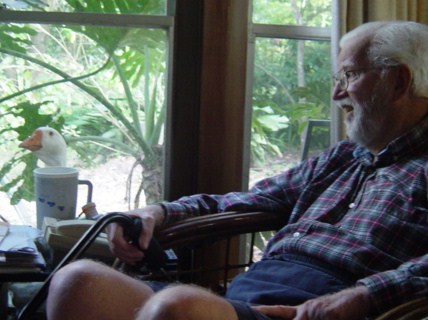
Following my dad, the bird waddled the length of the house to station himself outside the kitchen window, where he watched Dad eat lunch. Gator Goose repeated this exercise day after day, going from window to window as Dad moved throughout the house. When my dad went outside, Gator Goose stayed near him except for an occasional visit to the opaque green pond that was the focal point of the back yard. Gator Goose had earned his name from his eyes—one was orangish red, and the other was blue—the same colors as Dad’s favorite football team, the Florida Gators.
All too soon, Dad’s chair was empty. Years of diabetes proved too much for his heart, and his body wore out. Now it was Gator’s job to accompany my mother, who was feeling particularly lonely, from place to place. He faithfully followed her from one side of the house to the other, watching her, protecting her now that Dad could not. No one, not even the mailman, dared come between Gator Goose and my mother. With his hissing and flapping, he was prepared for a fight with anyone who might try. 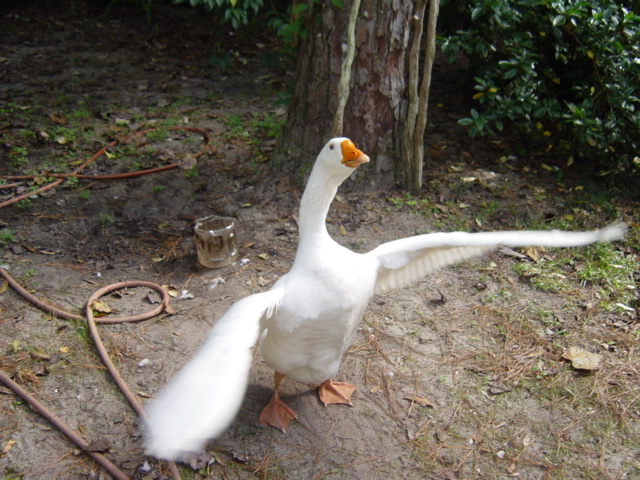
You can see his “prepared to protect mom” pose in this photo of him.
My sisters and I never knew why this goose was so loyal to my parents. We surmised, since geese have mates for life, that he had lost his mate and was looking to my parents to fill the void. Shortly after Dad’s chair was vacant, cancer took my mother’s life and now her chair was also left empty. Gator Goose was alone. There was no one else at home. What would he do?
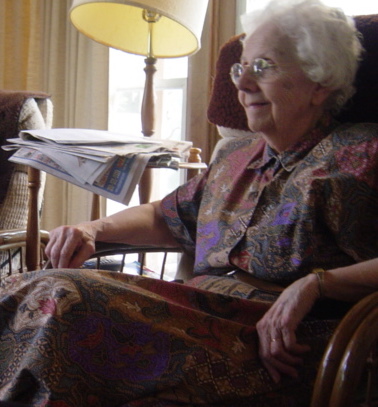 Gator Goose had complete access to the wide, unending horizon of the sky where he could soar with other geese. He had limitless ability to swim, play, dive and do all things goosely in the pond right in his back yard. Yet instead of experiencing the wind beneath his wings, the splash of the water and the view of the landscape from far above the earth, he was shackled to the invisible chains of the patio outside my parents’ brick house…waddling back and forth day after day, seemingly in search of somewhere to belong.
Gator Goose had complete access to the wide, unending horizon of the sky where he could soar with other geese. He had limitless ability to swim, play, dive and do all things goosely in the pond right in his back yard. Yet instead of experiencing the wind beneath his wings, the splash of the water and the view of the landscape from far above the earth, he was shackled to the invisible chains of the patio outside my parents’ brick house…waddling back and forth day after day, seemingly in search of somewhere to belong.
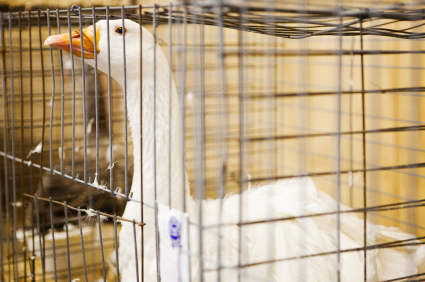 Have you ever felt like Gator Goose? Do you sometimes feel sad and isolated and like you don’t belong?
Have you ever felt like Gator Goose? Do you sometimes feel sad and isolated and like you don’t belong?
Shackled instead of free?
So many of us have experienced or are currently enduring great pain in life. Have you ever felt different, like no one can understand you? Have you ever felt a deep, nagging sense of loss? Have you ever felt rejected and worthless? Have you ever felt ashamed or guilty? Have you ever had a hard time figuring out “who you really are?”
Do you have a hard time letting people really know you, afraid that if they did, they wouldn’t accept you? Do you have a difficult time trusting others, often thinking they are out to hurt you? Do you feel the need to be in control?
If you answer yes to several of these questions, or if you know someone who struggles with these feelings, please read on.
Like Gator Goose, we can find ourselves feeling very alone in this world. Like the children’s game of Duck, Duck, Goose, we can feel that we are singled out as the one who is different from everyone else. 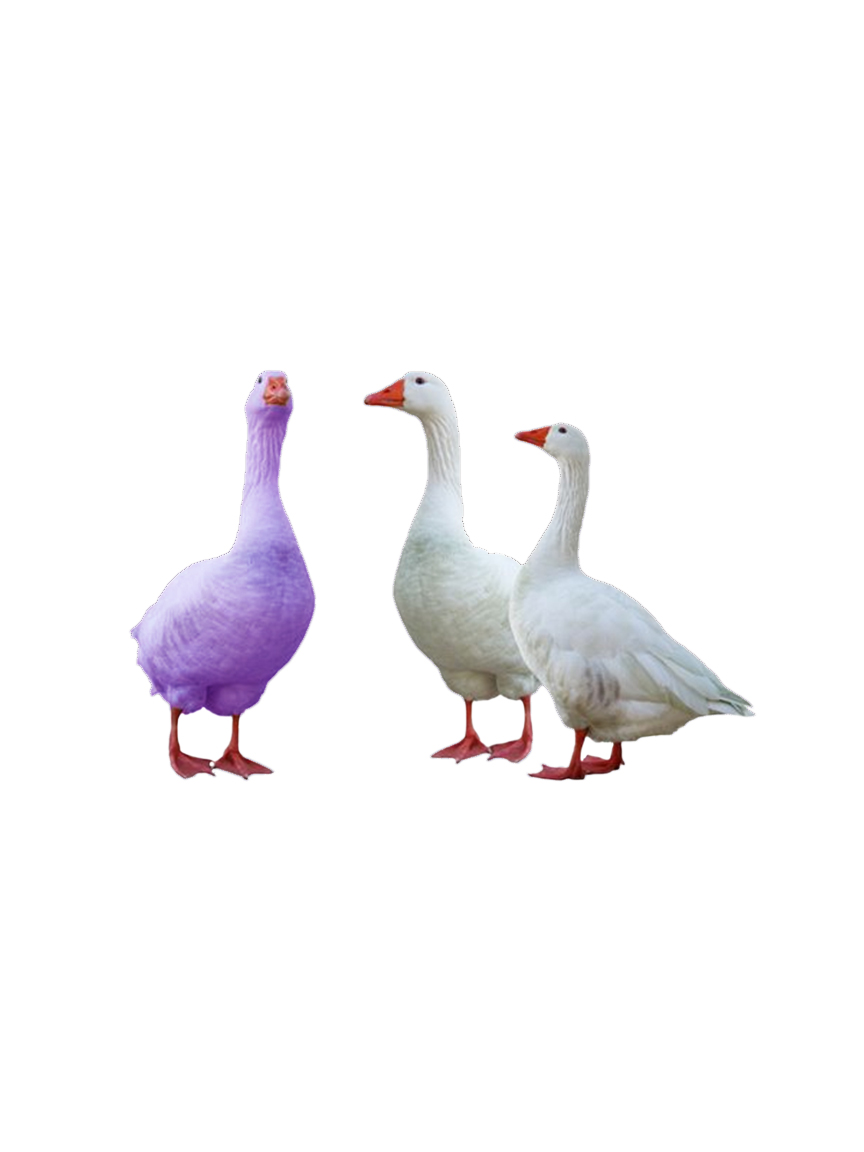
You are not alone.
Take heart in knowing that you are not alone. Throughout history,men and women have felt isolated and tormented to various degrees. The Bible gives us insight into numerous men and women who can relate to Gator Goose, and to us.
In Luke 8:43, we meet a woman who had severe and chronic bleeding. Surely this woman felt she could never function normally around other people. Deemed by society
as unclean and an outcast, her confidence was likely very low. Embarrassed and alone, she was desperate to get to Jesus, if only to touch his clothing. Could he take away her loneliness and despair?
A man with leprosy (Matthew 8:2) knew what it felt like to be rejected, never to be touched or hugged. He was not allowed to function near others, lest they catch this dreaded disease that devoured his own flesh. Was there hope to be found? Would Jesus really touch him?
The adulterous woman (John 8:3) was “caught in the act.” Brought out in her nakedness to face the judgment and jeers of the crowd, she also came face-to-face with Jesus. The crowd wanted to stone her. Feeling dirty and ashamed, could she ever look her neighbors in the eye again? Was her life over? Would Jesus throw the first stone?
The man called Legion (Mark 5:2) was deemed out of his mind. He continually cut himself on tombstones and likely wished he was buried under one of them. Trapped in mental anguish, he only knew the darkness of life. Why would Jesus ever know him or notice him? Surely anyone else was a more worthy candidate for Jesus’ attention.
These men and women from the New Testament give us several views into painful emotions we may have experienced. These very real people were desperate because of their pain. Where would they take it? Could anyone provide relief? Would anyone care? They chose to take their pain to a man who they heard had the power to heal and
to change lives, a man who people said truly cared. Jesus had compassion on them and healed them. He touched them, forgave them and gave them the power to
change.
It took courage and openness for them to face their pain and take it to Jesus. It takes the same courage and vulnerability to face our pain and take it to Jesus. Sometimes, however, like the paralyzed man whose friends lowered him through the roof to get to Jesus (Mark 2:4), we also need others to encourage and help us find him. In reality, pain may be a gift in disguise that leads to our healing as well as our ability to appreciate wellness. Individuals who have a physical disorder that desensitizes
them to pain end up in many perilous situations.
Perhaps you haven’t experienced such a painful history, but someone you love has. Understand that the window from which they view life will be different than yours. Take the time to try to understand them. This will take courage as well. Jacob, my youngest son (he was 24 years old at time of printing), has helped me “understand Goose” in a deeper way. Jacob spent the first twelve years of his life in a cinder-block orphanage in Romania. He had never even seen a family, or anyone who really cared for him. Then he came to join our family of five.
He and I could not have come from backgrounds more diverse. I grew up in America with a family who loved me and loved each other. He grew up in a country that had recently been released from an oppressive dictatorship, and he was without a family and without love. Jacob and I have had to learn through many trials to understand and appreciate one another. It has been a difficult journey and learning curve for both of us. I am sure I can never really appreciate (no matter how hard I try) the intense challenges that he has faced. These differences have caused us both to experience many emotions in our relationship. After several years spent feeling desperately discouraged,
fearing that we might never understand each other, or even truly enjoy each other’s company, I stand utterly amazed at the progress in our relationship! Jacob is my son and my friend.
If you are tempted to put this book down, thinking you can’t relate to our situation, please take note: Adoption isn’t the only experience that can cause you to feel out of place and misunderstood. Today’s world is filled with dysfunctional relationships. Many, if not most, individuals are in some way touched by neglect, abuse, death, divorce, addiction, financial difficulties or health challenges. If you have not yet experienced one or more of these situations, statistics tell us that you will. Our increasingly wired, virtual- reality world further contributes to relational dysfunction that affects our ability to feel the warmth of human connection. This “disconnect” can take root in the core of our souls and leave us feeling lonely inside of ourselves even when surrounded by a crowd.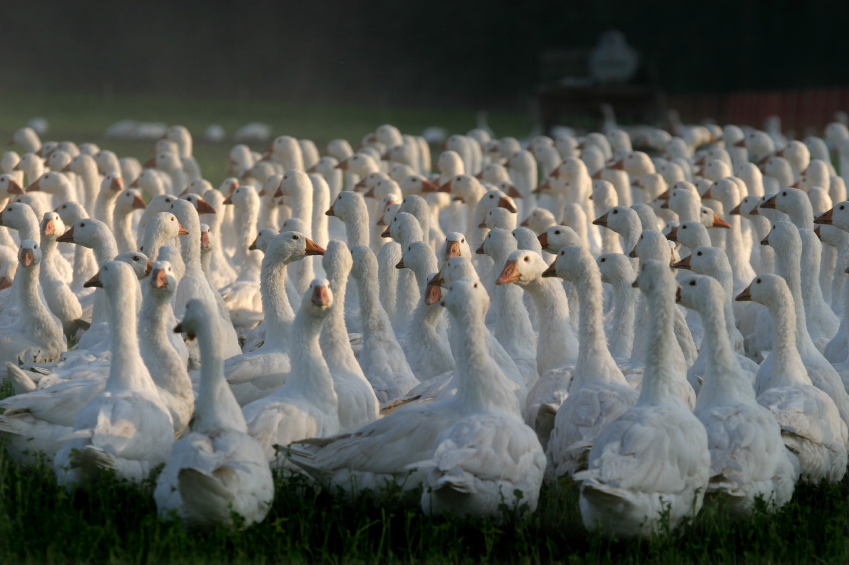 If you have ever felt different, alone or disconnected, I hope you will take heart and gain hope by reading this book. The lessons presented here are about bringing your pain to one who understands, cares, and can heal you if you let him. Gather your courage to face your pain and take it to him, as difficult as that seems. Only then can you know and experience the God of compassion and all comfort:
If you have ever felt different, alone or disconnected, I hope you will take heart and gain hope by reading this book. The lessons presented here are about bringing your pain to one who understands, cares, and can heal you if you let him. Gather your courage to face your pain and take it to him, as difficult as that seems. Only then can you know and experience the God of compassion and all comfort:
Praise be to the God and Father of our Lord Jesus Christ, the Father of compassion and the God of all comfort, who comforts us in all our troubles, so that we can comfort those in any trouble with the comfort we ourselves have received from God. (2 Corinthians 1:3–4)
As you read, my prayer is that you gain:
A greater understanding of yourself and why you do what you do and/or think the way you think. Most often there are underlying issues at the root of our actions and reactions. When we better understand those issues, we become more equipped to overcome them.
A deep comfort, knowing someone can really understand and relate to you.
The knowledge of how to gain the power to change through a real relationship with Jesus, the“Wonderful Counselor, Mighty God, Everlasting Father, Prince of Peace” (Isaiah 9:6).
A place to belong.
A confidence that you have something to offer others.
If you wish to pre-order this book please e-mail me at [email protected] or [email protected]. After September 1 it can be purchased directly from me, from my bookstore on Amazon, or directly from amazon.com.

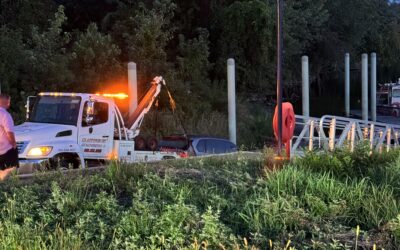

0 Comments